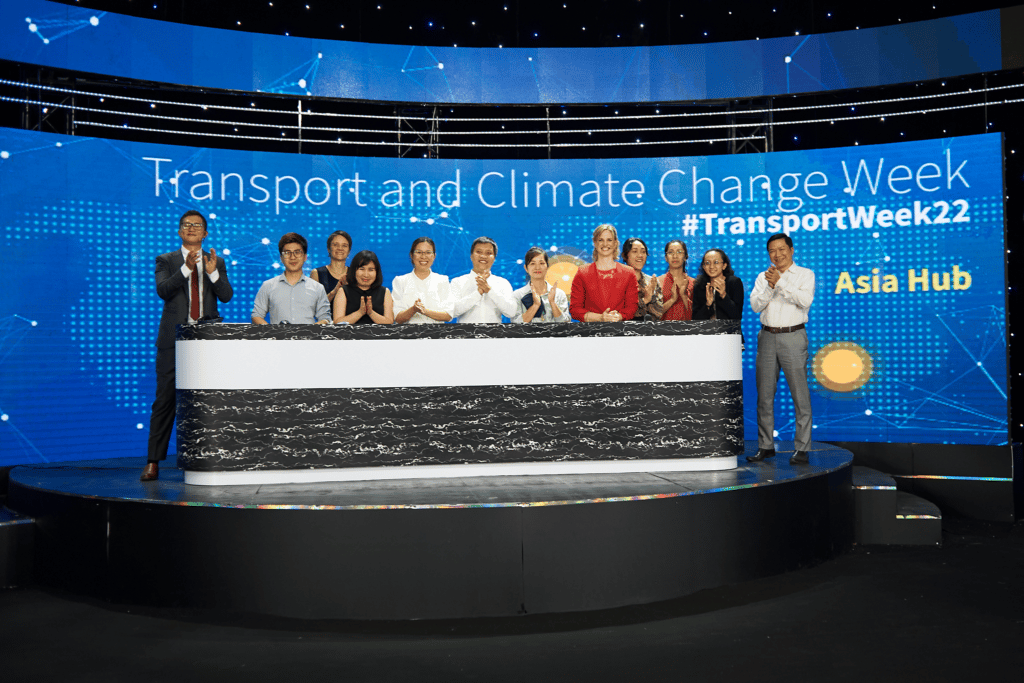
The Avoid-Shift-Improve approach, implemented by the GIZ since the early 1990s, remains at the heart of a sustainable transformation of the transport sector. This article focusses on Improve, which addresses the improvement of fuel efficiency, fuels and transport infrastructure. The Asia Conference Day as well as the conferences in the other regions of the Transport and Climate Change Week 2022 highlighted many opportunities for improvement in the transport sector.
Electrifying transport holds the largest potential to both reducing energy demand and increasing the use of renewable and local energy sources.
Oliver Krischer (Parliamentary State Secretary, Federal Ministry for Economic Affairs and Climate Action)
The large number and high density of fossil fuel vehicles in many Asian cities are a pivotal factor contributing to climate change, air and noise pollution. As the carbon budget left for 2020 to 2050 is 110 GT CO2, undoubtedly improved and electrified private and public transport fleets, particularly urban bus systems, are considered a key element in the efforts to reduce emissions. The early implementation of e-bus projects, especially in China, several cities across Asian countries and in Latin America, have proven that municipalities will have to play a key role in identifying alternative business models for large-scale e-bus deployment.
At the moment, upscaling e-bus projects from pilot stages remains a challenge. Ensuring long-term financing support for full-scale electrification is needed and requires a more favourable risk allocation. The adoption of alternate business models can overcome the challenge of initial capex for cities. However, TCO (total cost of ownership) optimization is becoming more important and adoption of smart digital services for project monitoring is the only way to ensure the sustainability of the projects over the full lifetime.
To successfully shift to more sustainable and fuel-efficient modes, policy makers, the private sector as well as consumers need to support the transition. Immediate action is required to meet goals such as achieving net zero emissions by mid-century. Thus, projects supporting governments and cities in their ambitions, such as the NDC Transport Initiative for Asia (NDC TIA), which is currently supporting Ho Chi Minh City’s (HCMC) e-mobility action plan, are crucial in that transition. The roadmap they are developing with the city’s Department of Transport will be pivotal for putting the city on a fast track to e-mobility adoption and will provide important lessons for other cities. National and city governments can accelerate EV uptake by putting in place favourable legislation and rolling out charging infrastructure.
In the session „eMobility – EV Charging Infrastructure“, at the Transport and Climate Change Week 2022, speakers from China, India, Indonesia, Thailand and Vietnam highlighted different aspects that are to be considered as Asian countries ramp up their electric mobility infrastructure. Prof. Le Anh Tuan (Hanoi University of Science and Technology) explained that in developing national and city level e-mobility roadmaps it is important to ensure that the roll-out of charging infrastructure is managed in a demand-oriented manner, also considering the capacity of the power grid.
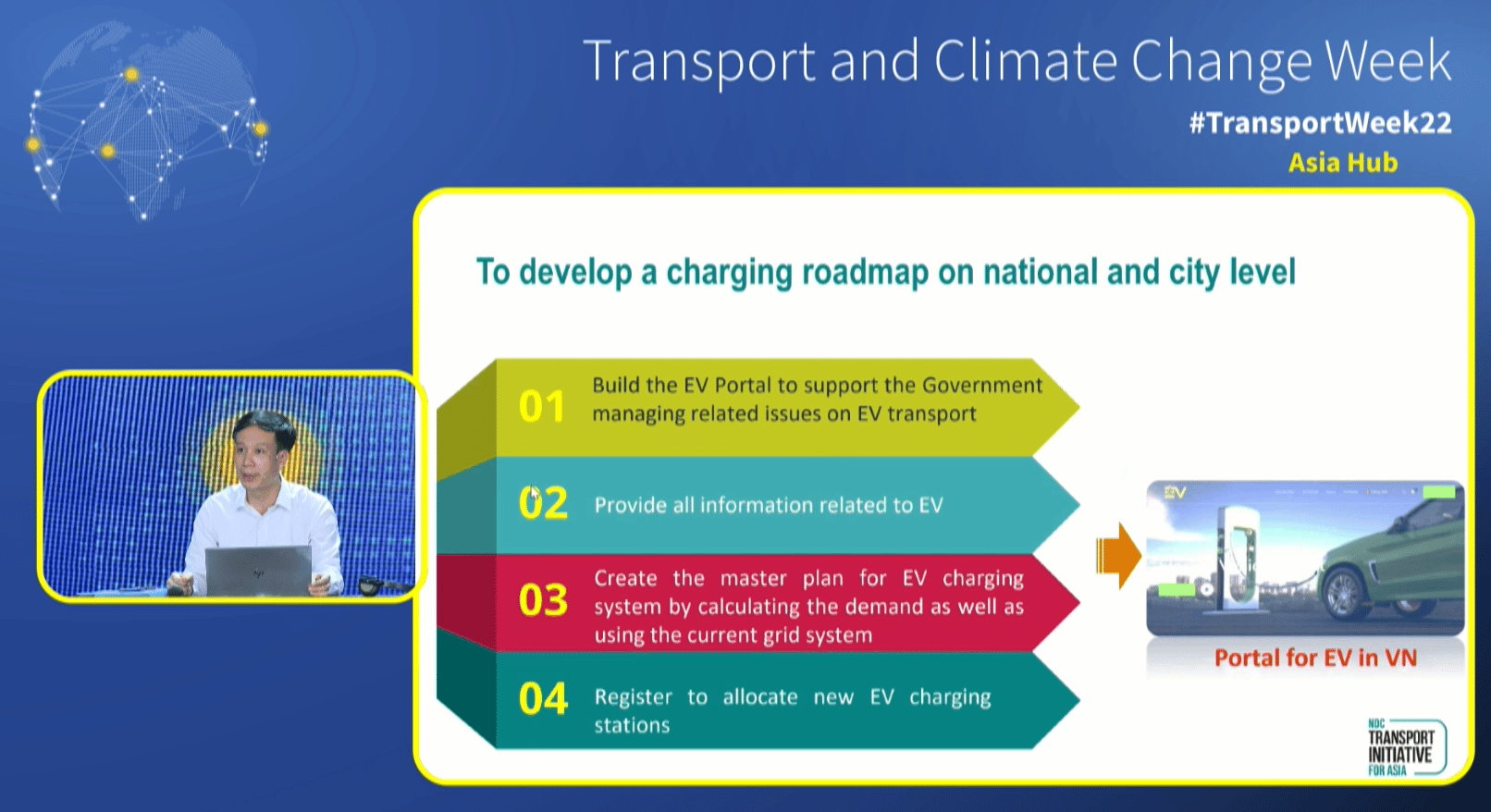
The integration of electric mobility into the power grid is also a major field of research in India. Here Prof. Zakir Hussain Rather (IIT Bombay) warned of the negative effects that uncoordinated EV charging can have on the grid and pledged for a key role of smart charging infrastructure.
A concrete example on successful roll-out of charging infrastructure was shown by Candra Rakhmat (Transjakarta), who presented the overnight depot charging operations for the first 30 e-buses in Jakarta. He highlighted the future importance of opportunity charging for the growing fleets of e-buses.
Dr. Pimpa Limthongkul (ENTEC, Thailand) and Mr. Hu Jinyong (CSAE, China) discussed the role of battery swapping, the hot topic in EV charging infrastructure. As the standardization of battery packs is a crucial element of the roll-out of battery swapping infrastructure, the multi-stakeholder project “Thailand Battery Swapping Platform” is developing battery packs that can be used by various motorcycle providers and charging operators.
In China, battery swapping technology is already being applied in the heavy-duty segment, where 6,000 vehicles are in operation and stations are available in over 50 cities.
Agreeing on standardized battery packs for battery swapping will increase interoperability between vehicle manufacturers and swapping station operators, driving down costs and increasing sustainability.
Dr. Pimpa Limthongkul (Research Team Leader, ENTEC Thailand)
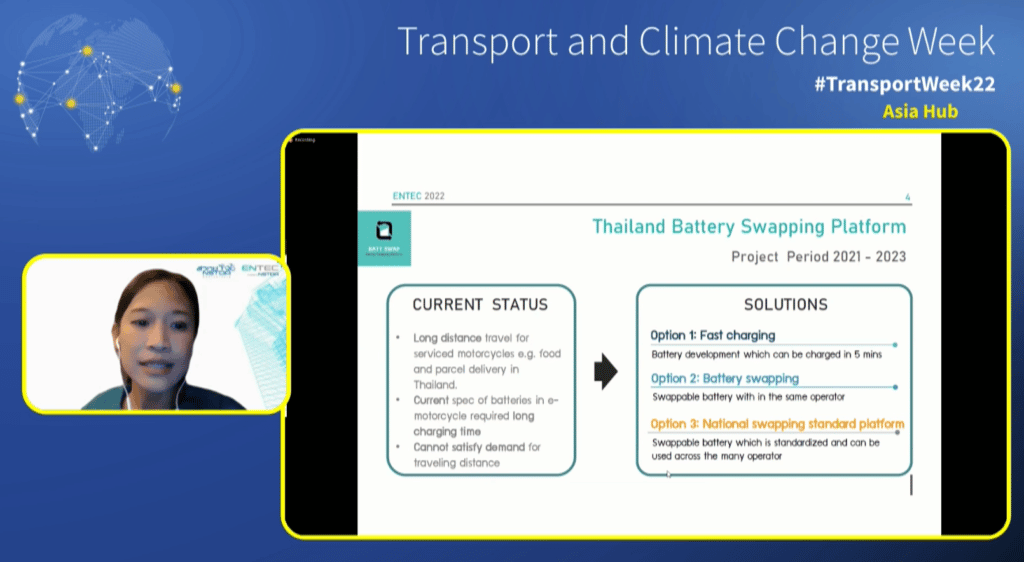
In the freight transport and logistics sector fossil fuels are burnt at an exceptionally large scale. Modal shift to railways is one solution, for which countries including Germany and India have ambitious political goals. Sustained political will is essential for having the necessary infrastructure planned, built, and utilized.
The CO2 benefit of mode-shift can be maximized with railway electrification. The honourable Special Secretary Amrit Meena, Head of the Department of Commerce, Ministry of Commerce and Industry, India, highlighted that his country is on track to achieve a 100% electrified network of broad-gauge railway by the end of next year.
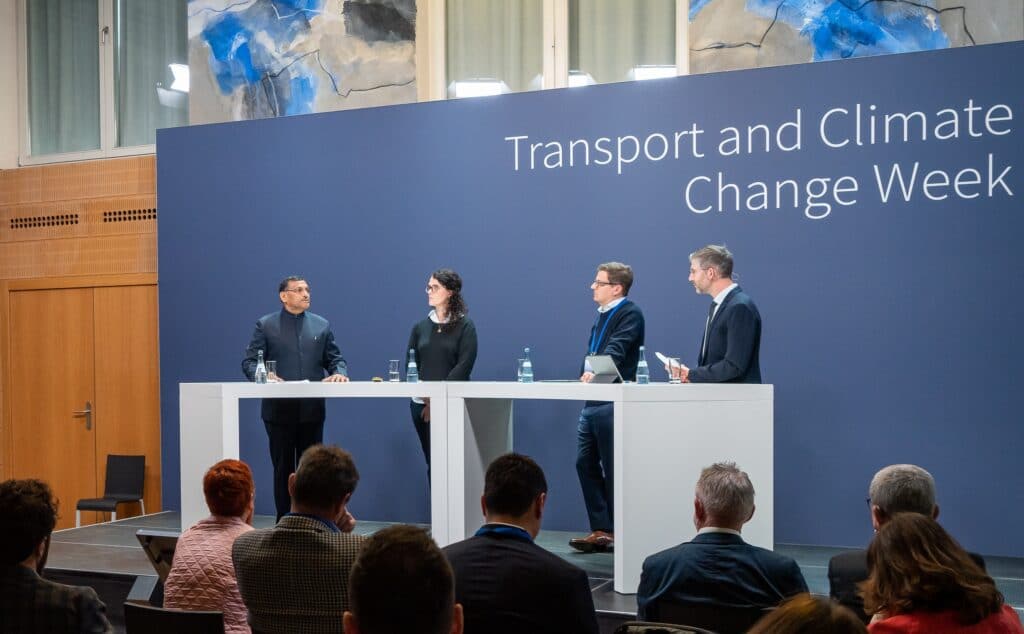

In many areas, transport is still too cheap, putting a price on carbon is essential for making companies reconsider their transport needs and investments. Moreover, measuring CO2 from freight transport and logistic operations remains a critical roadblock for supply chain decarbonisation. Methodologies and tools for carbon footprinting are in place, but they are not yet used widely or consistently by transport companies. Thus, industry-wide collaboration and sustained engagement of shippers, carriers and other supply chain actors is crucial for generating the emissions data.
In China, zero emission heavy-duty vehicles are promoted with a policy-mix of national and city-level sales targets, fuel economy standards and subsidies for vehicle purchase and provision of charging infrastructure. Electric urban logistics vehicles continue to become more common. To learn from such examples, the TCCW facilitates exchange on strategies and best practices, promoting collaboration on a global scale.
Improving transport goes beyond electrification and increasing fuel efficiency. It also entails adaptations to increase the accessibility for women, individuals with disabilities and minority groups, which are often not considered sufficiently when infrastructure is designed. One of the reasons being the underrepresentation of these groups in ministries, boards, and management positions where those decisions are made. To raise awareness about this issue, a panel of experts discussed the need and approaches to increase participation of underrepresented groups in the sector.
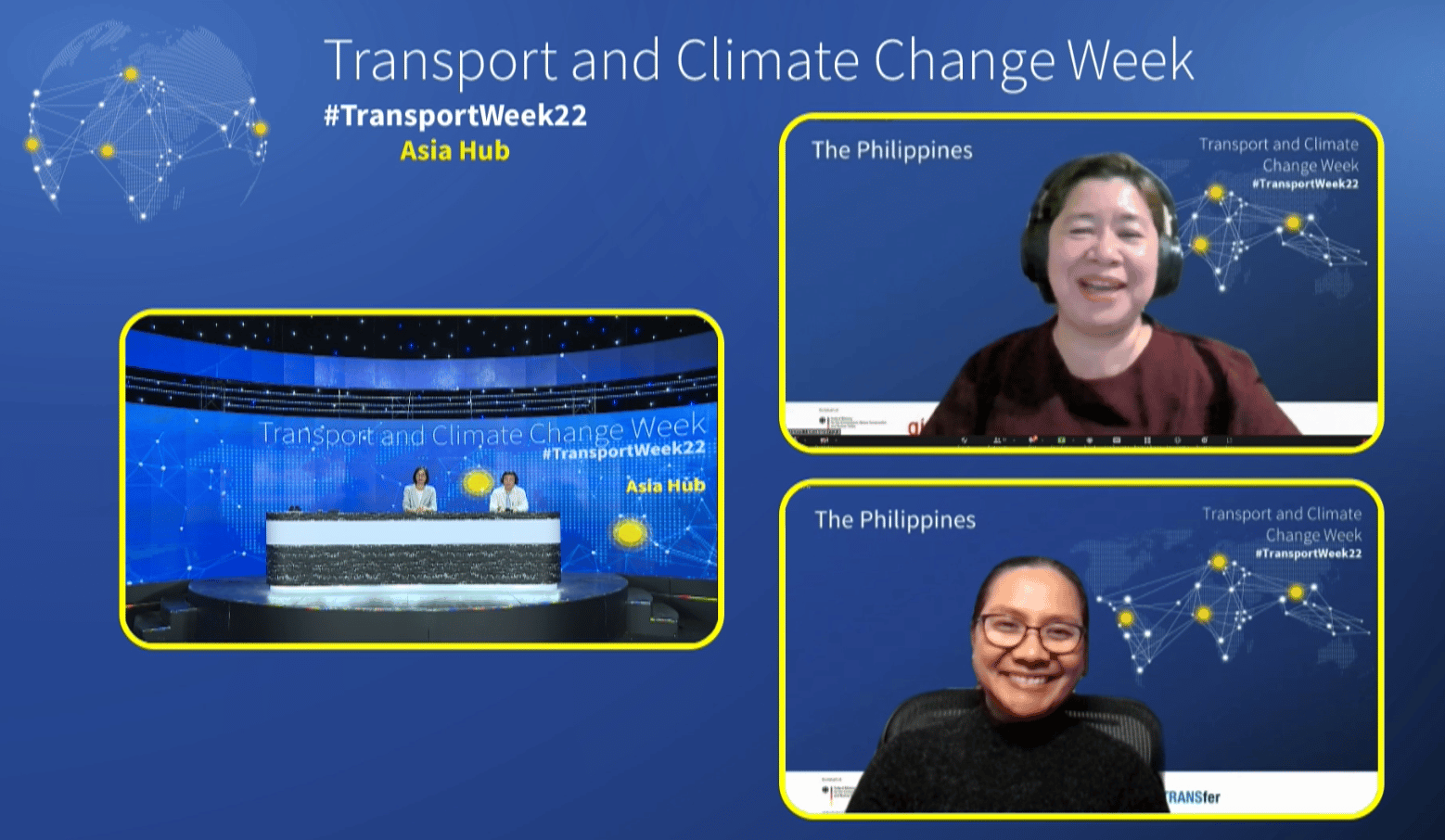
Many women across the world avoid using public transportation, walking, and cycling, especially at night, due to safety reasons. Bus and tram stations without sufficient lighting and security cameras, as well as a lack of secure bike lanes and sidewalks pose as an extensive barrier for women to choose public or active transportation modes over private vehicles.
To achieve the transition to net-zero mobility, the sustainable transport options need to become more accessible and safer for all groups of society. Therefore, the involvement of all stakeholders is crucial, as Dr. Derlie Mateo-Babiano, Convenor of Women in Transport Leadership, stated during the panel discussion at the Transport and Climate Change Week 2022:
If we come up with policies that respond to representation and participation and are co-produced with the stakeholders that we are trying to engage with, then we will have ownership and buy-in. Then, there is a high likelihood that they will be seamlessly implemented.
Dr. Derlie Mateo-Babiano (Convenor of Women in Transport Leadership)
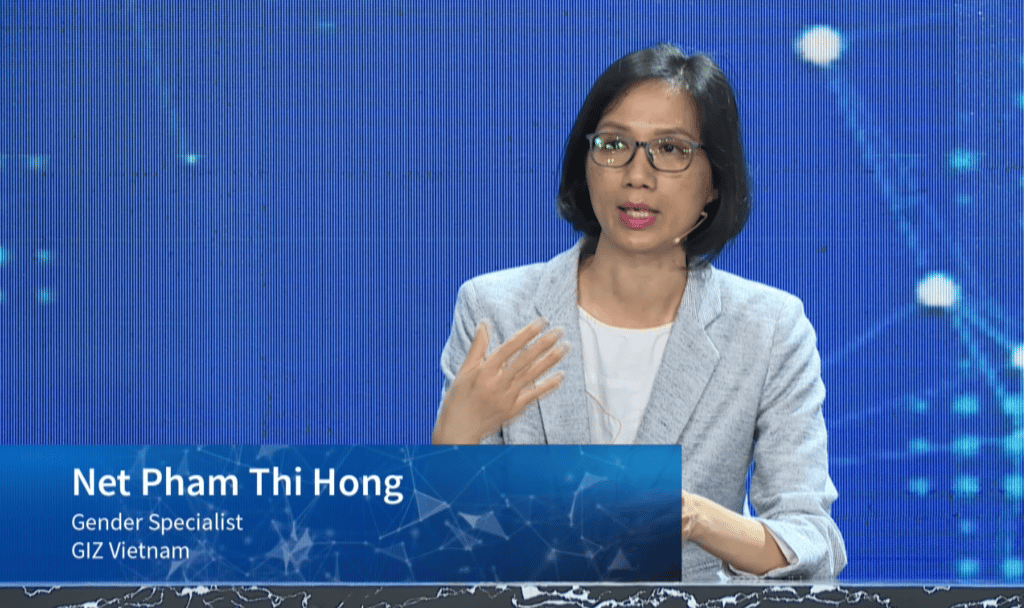


These improvements and adaptations combined, would greatly contribute to transforming the transport sector and reaching the goals and commitments set in the Paris Agreement and at COP26. Additionally, various other topics such as fiscal policies, digitalisation and active mobility, which were discussed throughout the conference days, are of high importance for a sustainable transformation.
In further articles you can get more insights from different regions that have discussed various topics during Transport and Climate Change Week 2022.
Recordings of almost all sessions are accessible through the Programme on transportweek.org and available on the Changing Transport YouTube Channel. Find more impressions of the week on Flickr!
Mark you calendars: The next Transport and Climate Change Week will take place in September 2023.
The Transport and Climate Change Week was organised for the 5th time and is funded through the International Climate Initiative (IKI) of the German Federal Ministry for Economic Affairs and Climate Action (BMWK) and the German Federal Ministry for the Environment, Nature Conservation, Nuclear Safety and Consumer Protection (BMUV). It involves partners of GIZ and other implementing organisations and is organised by the Changing Transport Team of GIZ.


Gwen Schmidt